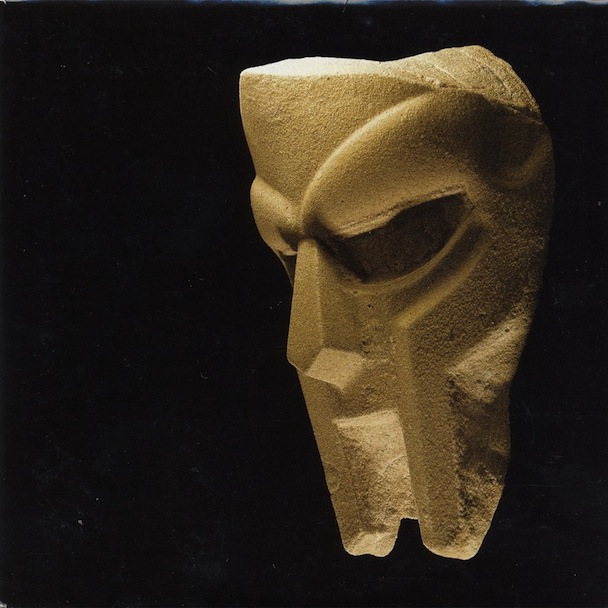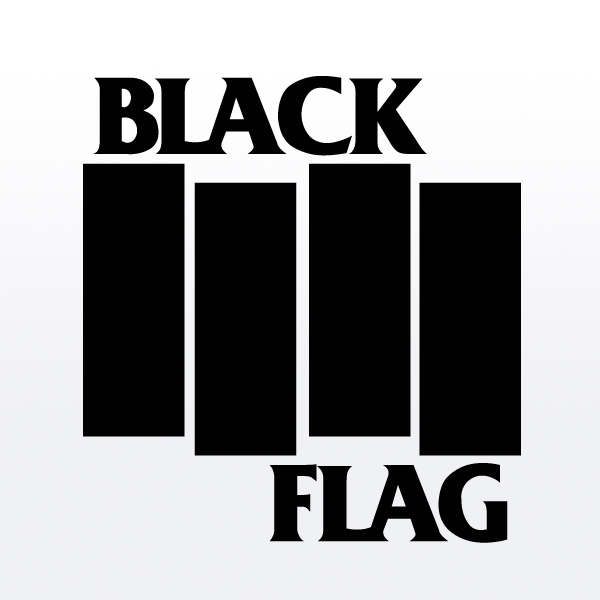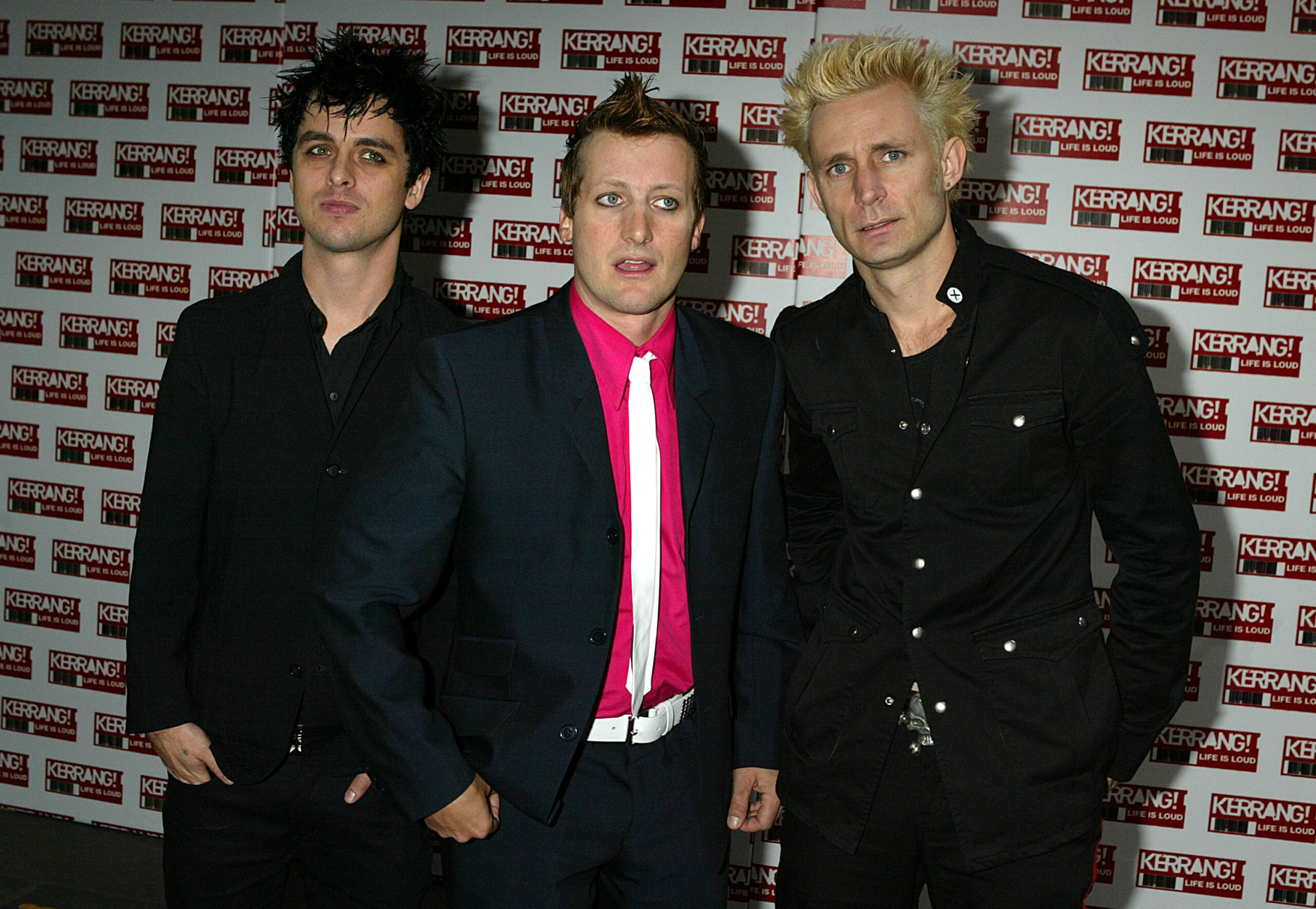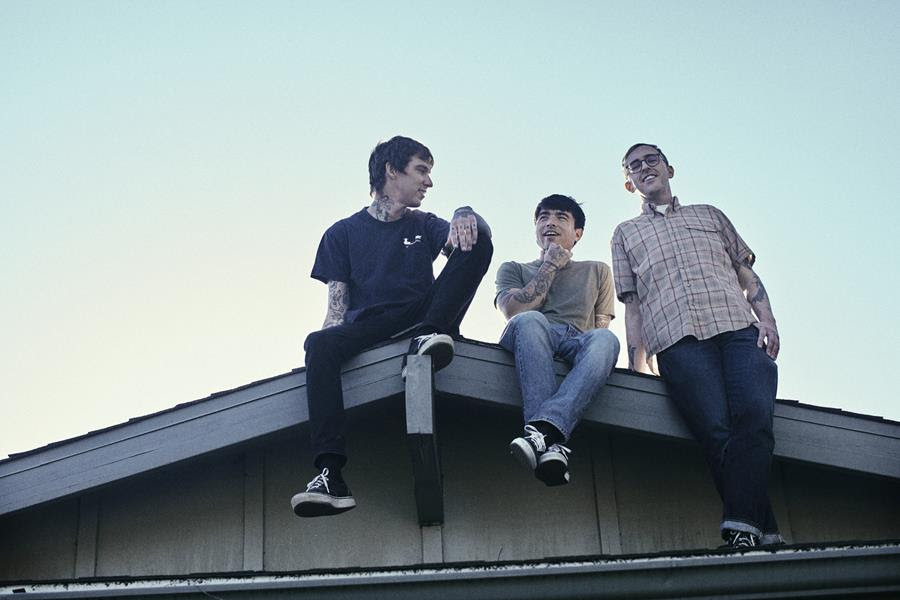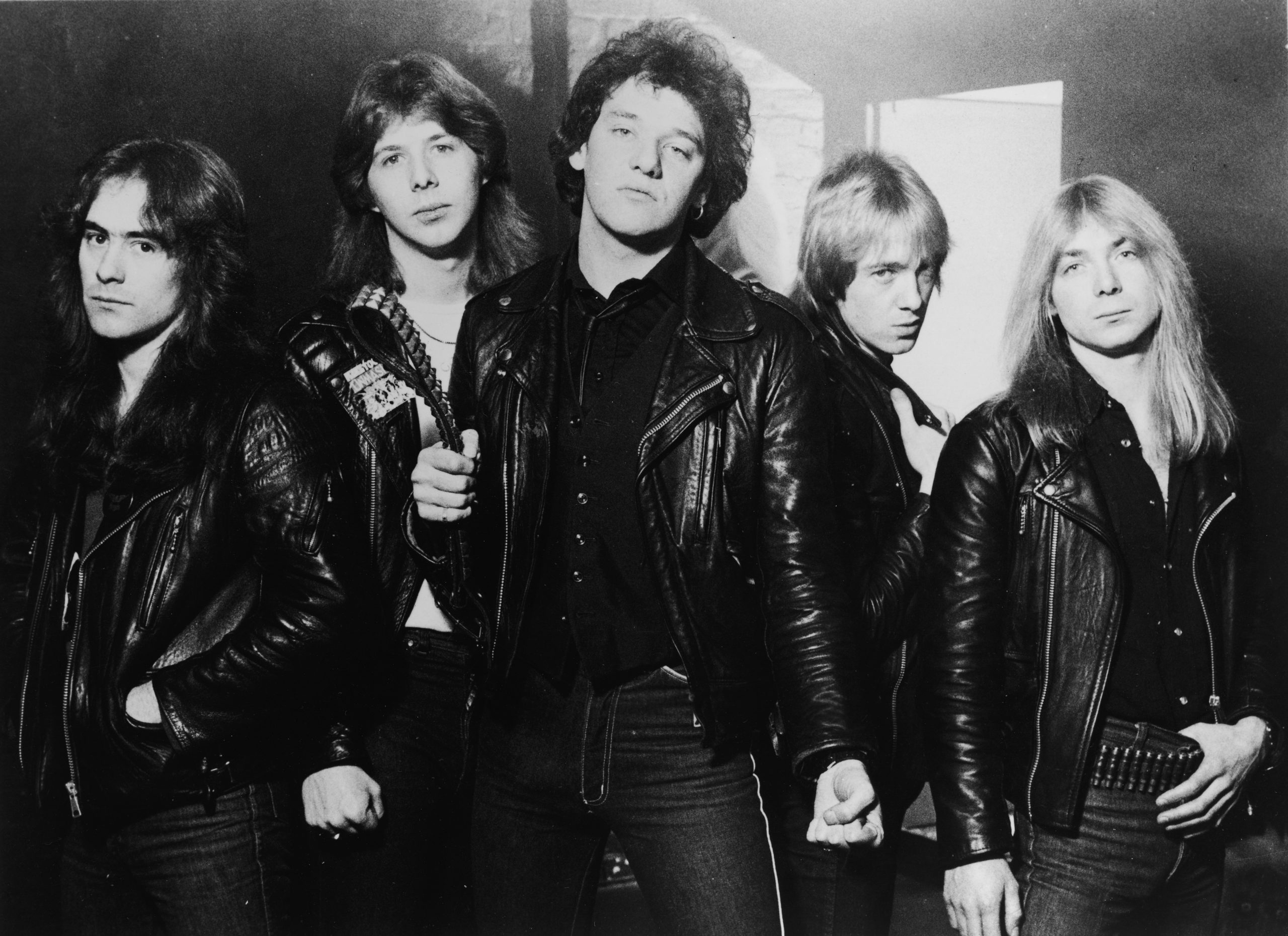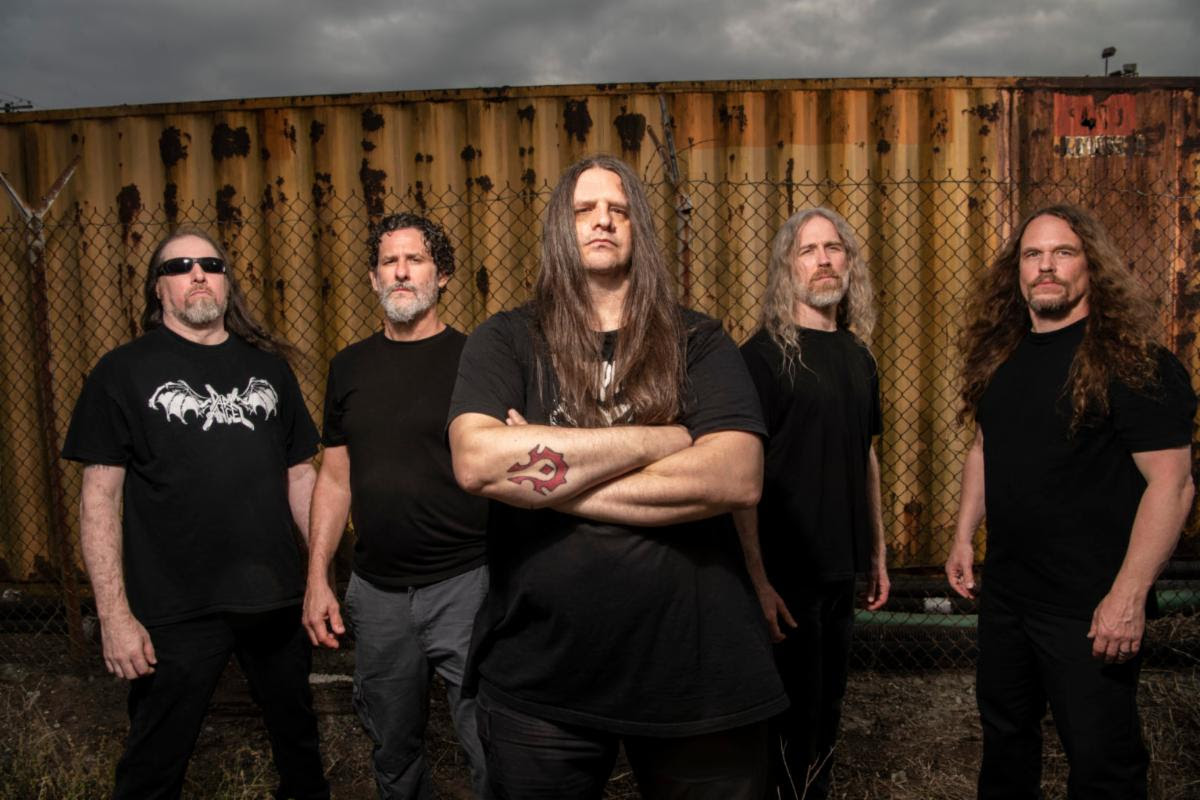Last year in the U.K., Carol Morley released Dreams Of A Life, a documentary about a woman who died in her North London apartment and was not found for three years. No one came looking. Police found her skeleton amongst Christmas presents yet to be wrapped.
The film's press materials and many of its critics posit it as an urban dweller's caveat -- "Would anyone miss you?" -- reminding us of the suffocating isolation possible even in a dense, social capital like London. But the talk surrounding the story barely hints at its most haunting detail: The television was on. For three years it chirped away, as programming changed and major news broke and Joyce Vincent rotted.
What unfurled and accumulated in that room -- years of sound and light, records of London and what London was watching -- that is the only possible analogue to the nightmarish cultural overflow of DOOM's music. Every album breathes with a distinct personality, each a shapeshifting assemblage of personage and programming that sounds more like a kind of miraculous hyperlinked sound collage than rap.
A London-born recluse himself, Daniel Dumile's path led him through New York and Atlanta -- two rap meccas -- from near-homelessness to the shelter of a metal mask. Along the way, he seemed to absorb everything around him. Having grown out of the most prolific period in rap music to date, starting roughly in the mid- to late-1980s, he experienced firsthand the sparkling wave of young, intelligent New Yorkers with politics that didn't overwhelm the soul of party music. He would collect and later reuse audio from cartoons, monster movies, news bulletins, and countless other sources. After a record label dispute and the death of his brother Subroc, killed crossing the Long Island Expressway, DOOM disappeared, resurfacing years later with a stocking over his head, and then always the mask. Part gladiator, part The Fantastic Four's Dr. Doom, it became a barrier, a platform for reinvention, a shield from the industry that he claims badly deformed him.
His lyrical feats go unmatched for sheer idiosyncrasy and insight; beyond rap enthusiasts, many of his strongest supporters are (perhaps unsurprisingly) writers and jazzheads. DOOM may not be the first rapper you'd throw on at a party, but he's definitely the only one to be "the supervillain cooler than a million / I'll be chillin' / still quick to slice squares like Sicilians." His references come from just about everywhere, but he prefers street language, old sayings, and things you can purchase at a bodega.
A master of "the microphone, beats, or the wheels of steel," he has constantly swapped out his tools and collaborators, avoiding revision and instead choosing reinvention. Beginning with his brother, he has worked with the entire spectrum of the rap universe, with the exception of any true "luxury" rapper. After KMD, he moved into totally different territory, often producing and rapping alongside members of the mysterious collective M.I.C. (Monsta Island Czars), crafting beats that favored oddly chopped samples, psychotically left-field source material, or simply unpleasant sounds. He became MF Doom, then MF DOOM, then simply DOOM, with a host of aliases along the way.
And the samples themselves -- they're almost more indicative of a DOOM song than DOOM's voice. They come from everywhere. You might suddenly recognize a "Kon Karne" background voice on a Frank Zappa record. And there's an Anita Baker piano riff. You'll find yourself falling asleep to a Godzilla movie, or was it Take Me To Your Leader?
It used to be that stumbling upon DOOM's samples was your only experience of him outside his music, but these days he's everywhere. Just after the release of JJ DOOM, at a moment when he's never been so forthcoming about where he is (London), what's happening (having a hard time getting back to the US after a customs mix-up), or what he's working on (finishing a new Madvillain album and the long-awaited DOOMSTARKS collaboration with Ghostface Killah), we go back to rediscover a little bit of the mysterious romance that keeps us thinking about DOOM. As his collaborations are so omnipresent as to be ubiquitous, we had to limit our coverage to full-length albums with DOOM rapping throughout, that were definitively not just beat libraries or production forays on M.I.C. records.
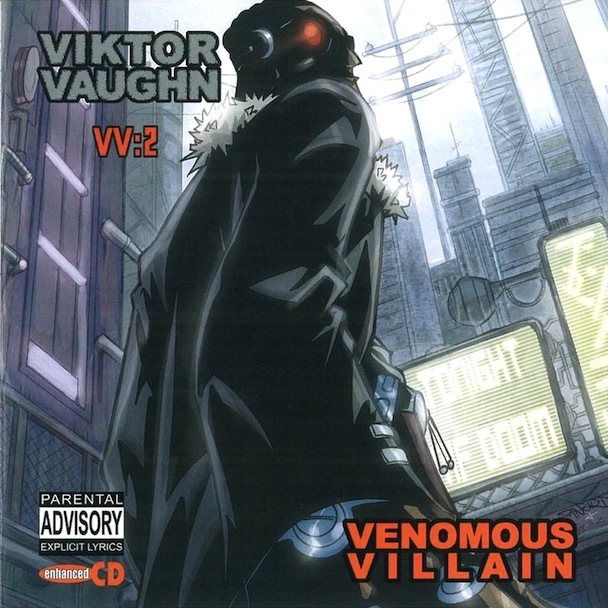
10. Viktor Vaughn - Venomous Villain (2004)
The second album from DOOM's nocturnal alias Viktor Vaughn finds Vik in a predictable place, running around at night trying to get into and then out of trouble. Unfortunately the rapping lacks life, though Kool Keith and DOOM drop some nice verses here and there. According to RapReviews.com, DOOM chose producers for each track based on a raffle, where unknowns could submit their work for a chance to be on Venomous Villain. The result inevitably feels a little slapdash, though there's some excellent, dark drum programming, à la the first Viktor Vaughn release.
Venomous Villain is the most inoffensive record in the DOOM catalogue, not even listed as a major release on DOOM's website. Alongside the circus of unsophisticated beatmakers in the background, DOOM's voice seems unsure of where to land at times, so even when he raps well, his self-aggrandizing flex skimps on the storytelling—the theater of nighthawks that populate Vaudeville Villain with are nowhere to be found.
10. Viktor Vaughn - Venomous Villain (2004)
The second album from DOOM's nocturnal alias Viktor Vaughn finds Vik in a predictable place, running around at night trying to get into and then out of trouble. Unfortunately the rapping lacks life, though Kool Keith and DOOM drop some nice verses here and there. According to RapReviews.com, DOOM chose producers for each track based on a raffle, where unknowns could submit their work for a chance to be on Venomous Villain. The result inevitably feels a little slapdash, though there's some excellent, dark drum programming, à la the first Viktor Vaughn release.
Venomous Villain is the most inoffensive record in the DOOM catalogue, not even listed as a major release on DOOM's website. Alongside the circus of unsophisticated beatmakers in the background, DOOM's voice seems unsure of where to land at times, so even when he raps well, his self-aggrandizing flex skimps on the storytelling—the theater of nighthawks that populate Vaudeville Villain with are nowhere to be found.
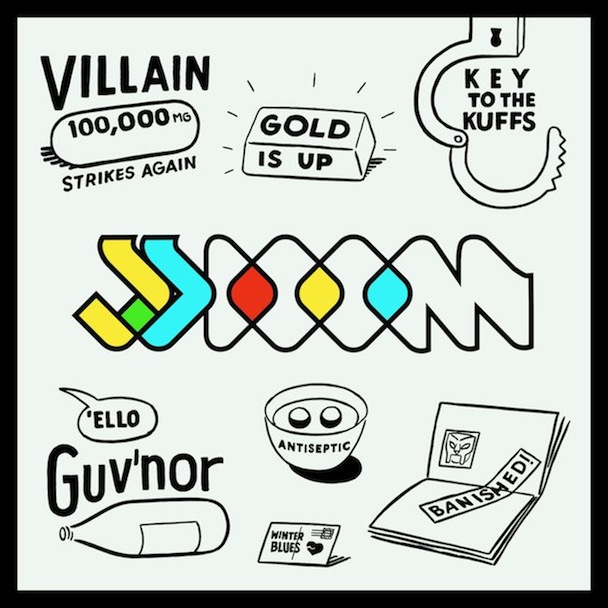
9. JJ DOOM - Key To The Kuffs (2012)
"Not to interrupt / But anybody else notice time speeding up?" (from "Banished")
In music, it's so rare when old talent doesn't die hard, when an artist matures fruitfully -- few things are more beautiful than hearing a wealth of experience inflect the work of a professional. And Key To The Kuffs, at the very least, stands up as an album. It's conceptually sound (ostensibly about DOOM's experiences having relocated to London for the past two years) and doesn't make the mistake of relying too heavily on old tricks.
But in the arena of contemporary music, the JJ DOOM project comes down decisively on the side of electronic wizardry -- beat-mavenism and sample composition -- not rap. DOOM knows how to graft himself onto an adept and idiosyncratic producer like Jneiro Janal, but he's vocally heavier and less tonally sensitive, as on 2009's Born Like This.
Though Janel is far from a novice, his moves on Key To The Kuffs recall Flying Lotus's warning about "kids who started making beats six months ago, thinking they can get on stage because their drums are off," delivered during an interview two years ago. Janel employs DOOM's drum stutters, off-time breaks, and sample collages, but they don't necessarily deliver the hyperparodic comedy or handcrafted warmth they might in DOOM's hands.
The best moments on the album are songs like "Rhymin' Slang," where Janel and DOOM make an effort to sound like neither of their past projects, to great effect. Hearing DOOM over a pseudo-Calypso beat during "Wash Your Hands" will give new faith to anyone who thought the man would never be able to leave the old school.
9. JJ DOOM - Key To The Kuffs (2012)
"Not to interrupt / But anybody else notice time speeding up?" (from "Banished")
In music, it's so rare when old talent doesn't die hard, when an artist matures fruitfully -- few things are more beautiful than hearing a wealth of experience inflect the work of a professional. And Key To The Kuffs, at the very least, stands up as an album. It's conceptually sound (ostensibly about DOOM's experiences having relocated to London for the past two years) and doesn't make the mistake of relying too heavily on old tricks.
But in the arena of contemporary music, the JJ DOOM project comes down decisively on the side of electronic wizardry -- beat-mavenism and sample composition -- not rap. DOOM knows how to graft himself onto an adept and idiosyncratic producer like Jneiro Janal, but he's vocally heavier and less tonally sensitive, as on 2009's Born Like This.
Though Janel is far from a novice, his moves on Key To The Kuffs recall Flying Lotus's warning about "kids who started making beats six months ago, thinking they can get on stage because their drums are off," delivered during an interview two years ago. Janel employs DOOM's drum stutters, off-time breaks, and sample collages, but they don't necessarily deliver the hyperparodic comedy or handcrafted warmth they might in DOOM's hands.
The best moments on the album are songs like "Rhymin' Slang," where Janel and DOOM make an effort to sound like neither of their past projects, to great effect. Hearing DOOM over a pseudo-Calypso beat during "Wash Your Hands" will give new faith to anyone who thought the man would never be able to leave the old school.
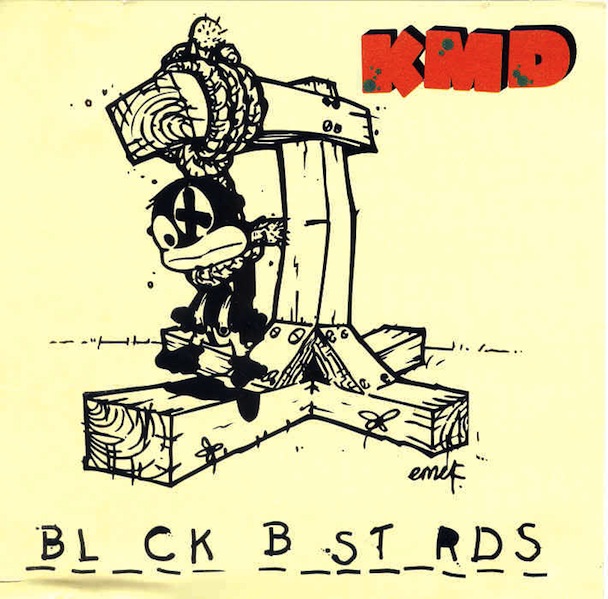
8. KMD - Black Bastards (2001)
Black Bastards finds Zev Love X, DOOM's first pseudonym, angrier and more confrontational than on KMD's debut. KMD (Kausing Much Damage) was DOOM's first rap group, which featured his brother Subroc and Rodan (later of Monsta Island Czars). They fell into a major confrontation with Elektra Records, whose executives disapproved of Black Bastards' cover art, boasting a lynched Sambo figure, and lyrics, which forwarded Afrocentrism and Five Percenter ideology (that is, a modernized African-American core of Islamic reformism).
Many bootlegged Black Bastards, and it eventually saw official release in 2001, via Sub Verse. The album swings with the best '90s jazz-rappers from Brooklyn and Harlem, but borrows from drum-heavier experiments happening on the West Coast, at times nearly assuming the sneer of gangsta rap.
8. KMD - Black Bastards (2001)
Black Bastards finds Zev Love X, DOOM's first pseudonym, angrier and more confrontational than on KMD's debut. KMD (Kausing Much Damage) was DOOM's first rap group, which featured his brother Subroc and Rodan (later of Monsta Island Czars). They fell into a major confrontation with Elektra Records, whose executives disapproved of Black Bastards' cover art, boasting a lynched Sambo figure, and lyrics, which forwarded Afrocentrism and Five Percenter ideology (that is, a modernized African-American core of Islamic reformism).
Many bootlegged Black Bastards, and it eventually saw official release in 2001, via Sub Verse. The album swings with the best '90s jazz-rappers from Brooklyn and Harlem, but borrows from drum-heavier experiments happening on the West Coast, at times nearly assuming the sneer of gangsta rap.
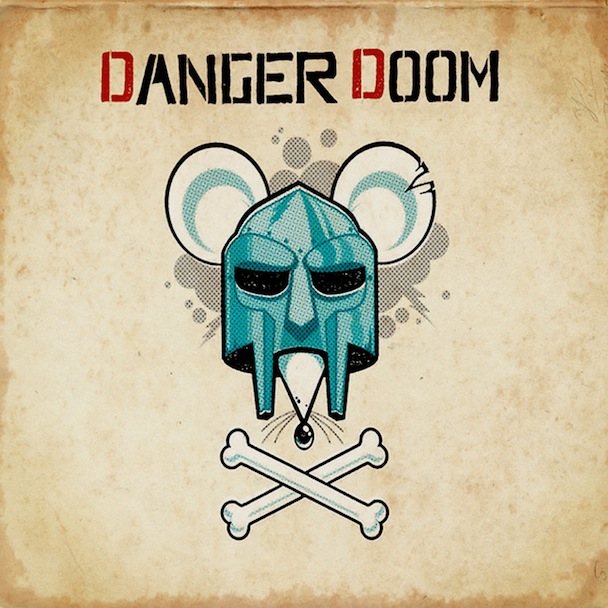
7. DANGERDOOM - The Mouse And The Mask (2005)
2005's collaboration The Mouse and the Mask should really be attributed to MF DOOM, Danger Mouse, and stoner cartoon network Adult Swim. Spawning what's become an ongoing relationship between the network and DOOM, the album features vocals from the casts of Adult Swim's then-major shows, particularly Aqua Teen Hunger Force, Sealab 2021, and Harvey Birdman.
In a sense DOOM could not have found a more perfect patron than Adult Swim -- whose programming comes from writers both mocking and reveling in the wonders of bad sci-fi -- but he came very close to falling flat with The Mouse And The Mask by partnering with a television network. The gimmicky nature of the cameos and curse-bleeping ends up being hilarious, and is saved by the fascinating assertion that, as Talib Kweli quips on "Old School Rules," "I might be bugging, but it seems to me / that cartoons be realer than reality TV."
It doesn't hurt that DOOM is a fantastic host, flying through each verse in rare form, chummily ushering the "real" characters into his cinematic universe, and getting mind-blowing results from forcing tons of lines to rhyme. "Heaven-scented" from the opening track is my favorite coinage.
7. DANGERDOOM - The Mouse And The Mask (2005)
2005's collaboration The Mouse and the Mask should really be attributed to MF DOOM, Danger Mouse, and stoner cartoon network Adult Swim. Spawning what's become an ongoing relationship between the network and DOOM, the album features vocals from the casts of Adult Swim's then-major shows, particularly Aqua Teen Hunger Force, Sealab 2021, and Harvey Birdman.
In a sense DOOM could not have found a more perfect patron than Adult Swim -- whose programming comes from writers both mocking and reveling in the wonders of bad sci-fi -- but he came very close to falling flat with The Mouse And The Mask by partnering with a television network. The gimmicky nature of the cameos and curse-bleeping ends up being hilarious, and is saved by the fascinating assertion that, as Talib Kweli quips on "Old School Rules," "I might be bugging, but it seems to me / that cartoons be realer than reality TV."
It doesn't hurt that DOOM is a fantastic host, flying through each verse in rare form, chummily ushering the "real" characters into his cinematic universe, and getting mind-blowing results from forcing tons of lines to rhyme. "Heaven-scented" from the opening track is my favorite coinage.
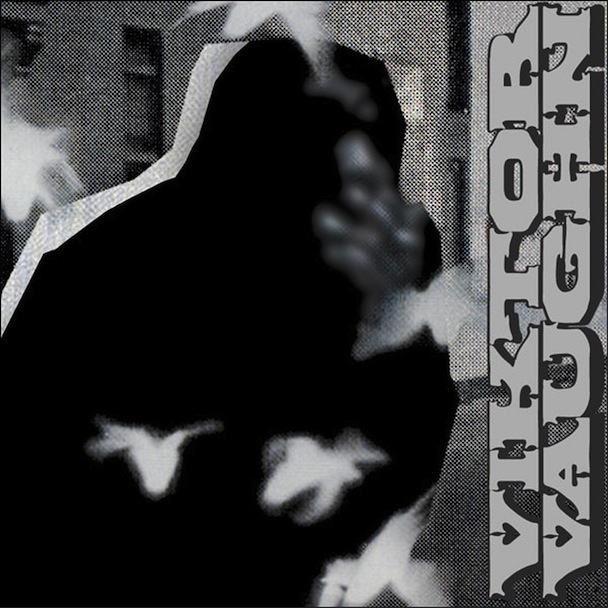
6. Viktor Vaughn - Vaudeville Villain (2003)
Listening to Vaudeville Villain,the first release from DOOM's nocturnal counterpart Viktor Vaughn, during the day can feel creepy. Ultimately it's an album for the night, about the night, deploying a fog of droning electronic frequencies and critter-like beat skitters. As Vaughn travels through cop-killer New York, DOOM coaxes augmented and suspended chords from his string samples, which recall stalking and pursuit music from noir and sci-fi movies. We see Vaughn (a play on Viktor Von Doom, Dr. Doom's real name) intercept cop radio in Queens, flee after killing a policeman, and resurface menacingly in a restaurant in Chinatown. Vaudeville Villain conjures darkly technical, scientific imagery, with DOOM trading in his cape and cocaine for a "biohazard suit" and "some type of aspirin, anbesol medicine,"
As grave as the album gets, Viktor still "bring[s] the beef like a trucker to Fuddrucker," allowing himself a lot of lowball jokes about New York minorities and even a tender, regretful ballad in the form of "Let Me Watch." The sound bounces lushly, but the concept remains airtight.
6. Viktor Vaughn - Vaudeville Villain (2003)
Listening to Vaudeville Villain,the first release from DOOM's nocturnal counterpart Viktor Vaughn, during the day can feel creepy. Ultimately it's an album for the night, about the night, deploying a fog of droning electronic frequencies and critter-like beat skitters. As Vaughn travels through cop-killer New York, DOOM coaxes augmented and suspended chords from his string samples, which recall stalking and pursuit music from noir and sci-fi movies. We see Vaughn (a play on Viktor Von Doom, Dr. Doom's real name) intercept cop radio in Queens, flee after killing a policeman, and resurface menacingly in a restaurant in Chinatown. Vaudeville Villain conjures darkly technical, scientific imagery, with DOOM trading in his cape and cocaine for a "biohazard suit" and "some type of aspirin, anbesol medicine,"
As grave as the album gets, Viktor still "bring[s] the beef like a trucker to Fuddrucker," allowing himself a lot of lowball jokes about New York minorities and even a tender, regretful ballad in the form of "Let Me Watch." The sound bounces lushly, but the concept remains airtight.
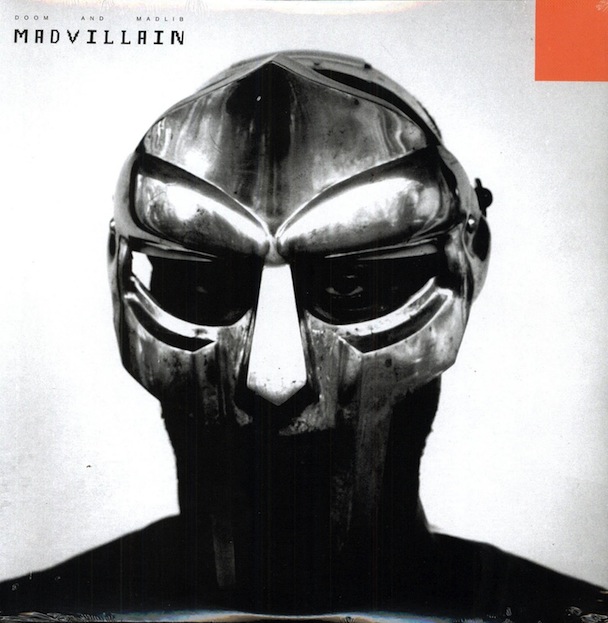
5. Madvillain - Madvillainy (2004)
The abuse of stereo panning makes Madvillainy an almost painful aural experience, at times (like during "The Illest Villains") sending sound so quickly between your ears that it can make you queasy. Of course the other side of the pain is the unmistakable, terrible pleasure of Madlib's production. His work sometimes hovers around too perfect, with tones excruciatingly rounded and the crackle of spinning vinyl warming your eardrums like a nearby campfire.
I'm nitpicking. Madvillainy sings springtime, flutes alive and the just-awoken comfort of old organs and electric pianos. DOOM, officially "ALL CAPS," emerges triumphant, assured, and ready to battle, unlike the suspect hedonist behind the same year's Mm.. Food. DOOM and Madlib are made for each other, and the light-hearted delights of Madlib's production inspire an awesome range of humor throughout the album that results in a flowing, confident DOOM with rascally positivity:
Last wish, I wish I had two more wishes
And I wish they fixed the door to the Matrix, there's mad glitches
Spit so many verses sometimes my jaw twitches
One thing this party could use is more ... booze.
5. Madvillain - Madvillainy (2004)
The abuse of stereo panning makes Madvillainy an almost painful aural experience, at times (like during "The Illest Villains") sending sound so quickly between your ears that it can make you queasy. Of course the other side of the pain is the unmistakable, terrible pleasure of Madlib's production. His work sometimes hovers around too perfect, with tones excruciatingly rounded and the crackle of spinning vinyl warming your eardrums like a nearby campfire.
I'm nitpicking. Madvillainy sings springtime, flutes alive and the just-awoken comfort of old organs and electric pianos. DOOM, officially "ALL CAPS," emerges triumphant, assured, and ready to battle, unlike the suspect hedonist behind the same year's Mm.. Food. DOOM and Madlib are made for each other, and the light-hearted delights of Madlib's production inspire an awesome range of humor throughout the album that results in a flowing, confident DOOM with rascally positivity:
Last wish, I wish I had two more wishes
And I wish they fixed the door to the Matrix, there's mad glitches
Spit so many verses sometimes my jaw twitches
One thing this party could use is more ... booze.
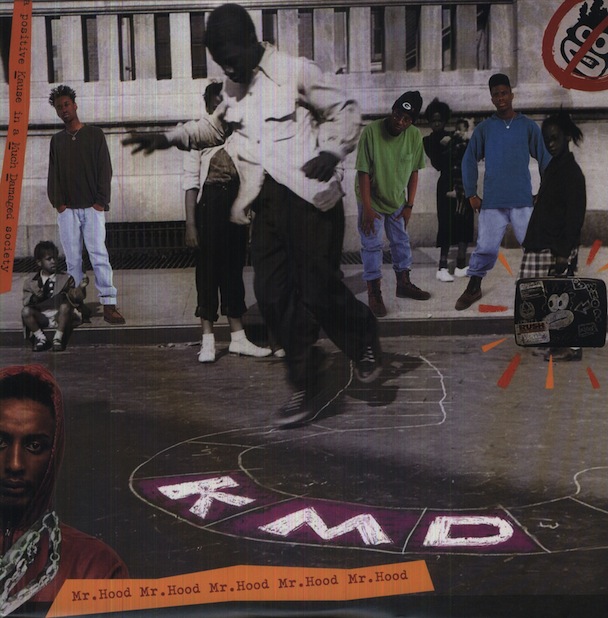
4. KMD - Mr. Hood (1991)
For a DOOM fan, finding Mr. Hood is comparable to what finding One Foot In The Grave is to a Beck fan: An idol has delivered flawless production and trailblazing songwriting for years, and then your shovel thuds into a buried chest. He made this? First?
Mr. Hood is the first of two releases from KMD, DOOM's first rap group. It was 1991. Everyone involved was very young: DOOM went by Zev Love X, and Onyx The Birthstone Kid replaced Rodan, who would leave the group before Mr. Hood to finish high school.
Be careful in there: Mr. Hood overwhelms, as three very capable young rappers deliver an hour's worth of music, with little filler and incisively playful, political sampling throughout. On the skits, Zev and the other members of KMD banter in white-sounding voices from language-learning tapes. It's got the jazz samples, the pride, and the unflagging bounce of New York in the early '90s: KMD sounds straight out of a montage in a Spike Lee movie.
We hear DOOM before DOOM. He raps on all but two songs, lyrically overflowing and already with a twisted tongue, but steeped like his peers in Five Percenter and Golden Age hip hop positivity. There's a lot of sarcasm and a lot of thinking about the young black man in America, but none of the theatrical distance or menace of all subsequent Metal Face projects. It's an amazing nugget that allows what I had thought impossible years ago: an honest look at the beginnings of an illegible, irreverent saboteur.
4. KMD - Mr. Hood (1991)
For a DOOM fan, finding Mr. Hood is comparable to what finding One Foot In The Grave is to a Beck fan: An idol has delivered flawless production and trailblazing songwriting for years, and then your shovel thuds into a buried chest. He made this? First?
Mr. Hood is the first of two releases from KMD, DOOM's first rap group. It was 1991. Everyone involved was very young: DOOM went by Zev Love X, and Onyx The Birthstone Kid replaced Rodan, who would leave the group before Mr. Hood to finish high school.
Be careful in there: Mr. Hood overwhelms, as three very capable young rappers deliver an hour's worth of music, with little filler and incisively playful, political sampling throughout. On the skits, Zev and the other members of KMD banter in white-sounding voices from language-learning tapes. It's got the jazz samples, the pride, and the unflagging bounce of New York in the early '90s: KMD sounds straight out of a montage in a Spike Lee movie.
We hear DOOM before DOOM. He raps on all but two songs, lyrically overflowing and already with a twisted tongue, but steeped like his peers in Five Percenter and Golden Age hip hop positivity. There's a lot of sarcasm and a lot of thinking about the young black man in America, but none of the theatrical distance or menace of all subsequent Metal Face projects. It's an amazing nugget that allows what I had thought impossible years ago: an honest look at the beginnings of an illegible, irreverent saboteur.
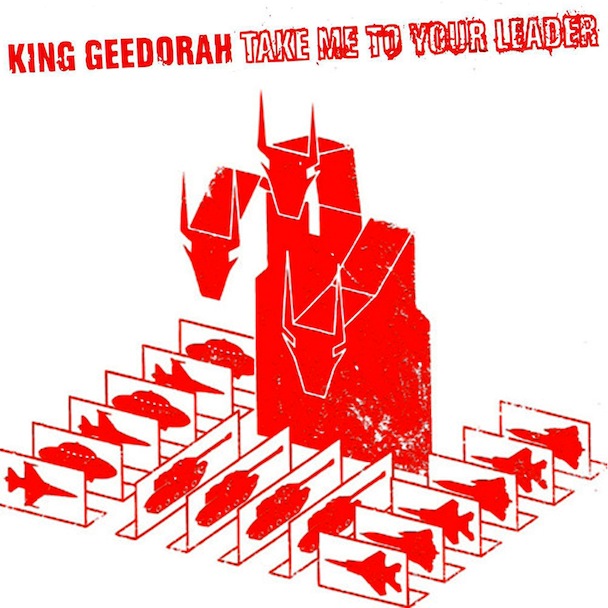
3. King Geedorah - Take Me To Your Leader (2003)
"Geedorah is a space monster. He's not from the Earth. I made it different on purpose." -- DOOM on Take Me To Your Leader
DOOM's inhabiting the three-headed monster from Godzilla movies may be his most successful sidestep yet. As King Geedorah, DOOM took the chance to make an album that's quite odd. A number of the tracks feature members of the Monsta Island Czars collective (Rodan, Gigan, MF Grimm, etc.) in full force, often rapping over songs that ride one loop for several minutes. The sample audio quality is generally horrible, and the music chosen can be distorted or ambient, as on "No Snakes Alive."
But Take Me To Your Leader somehow manages to impress the whole way through, with King Geedorah giving space to tracks like Gigan's "Krazy World," the mumbly whims of which at first alienate us, then hypnotically draw us in.
In the beginning, the album's outer-space vibes seem too difficult to groove to, but by the halfway point we can't wait for Mr. Fantastik to spread the word "expeditiously" over an entire bar. The attention to language astounds, as always, with DOOM often playing the role of town crier ("Render unto Geedorah what is Geedorah's!"). But DOOM's relative absence as rapper and extreme presence as a producer allows him to patronize rappers that he does support, and to entice us as listeners to really think about the environments created by our music. As such, the sound collage elements flow flawlessly, making Take Me To Your Leader a great story if nothing else, and an incredible representation of monster movie hysteria that shouldn't be missed.
3. King Geedorah - Take Me To Your Leader (2003)
"Geedorah is a space monster. He's not from the Earth. I made it different on purpose." -- DOOM on Take Me To Your Leader
DOOM's inhabiting the three-headed monster from Godzilla movies may be his most successful sidestep yet. As King Geedorah, DOOM took the chance to make an album that's quite odd. A number of the tracks feature members of the Monsta Island Czars collective (Rodan, Gigan, MF Grimm, etc.) in full force, often rapping over songs that ride one loop for several minutes. The sample audio quality is generally horrible, and the music chosen can be distorted or ambient, as on "No Snakes Alive."
But Take Me To Your Leader somehow manages to impress the whole way through, with King Geedorah giving space to tracks like Gigan's "Krazy World," the mumbly whims of which at first alienate us, then hypnotically draw us in.
In the beginning, the album's outer-space vibes seem too difficult to groove to, but by the halfway point we can't wait for Mr. Fantastik to spread the word "expeditiously" over an entire bar. The attention to language astounds, as always, with DOOM often playing the role of town crier ("Render unto Geedorah what is Geedorah's!"). But DOOM's relative absence as rapper and extreme presence as a producer allows him to patronize rappers that he does support, and to entice us as listeners to really think about the environments created by our music. As such, the sound collage elements flow flawlessly, making Take Me To Your Leader a great story if nothing else, and an incredible representation of monster movie hysteria that shouldn't be missed.
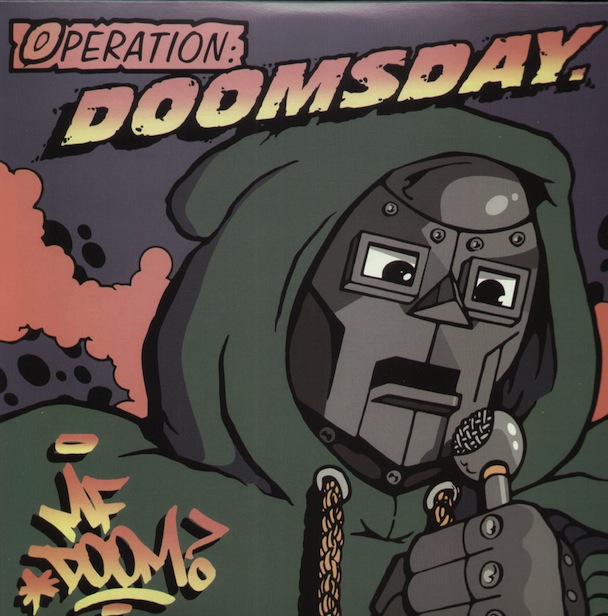
2. MF DOOM - Operation: Doomsday (1999)
After living "damn near homeless," wandering around New York and Atlanta, performing with a stocking on his head, and then commissioning a mask from graffiti artist Lord Scotch, MF Doom finally released Operation: Doomsday through DJ "Bobbito" Garcia's Fondle 'Em Records, in 1999. It's absolutely massive -- a dumbfounding, room-hushing classic.
As with most of DOOM's output, you can't comprehend Operation: Doomsday immediately. It's like being close to an extremely large object: At first, you encounter its texture intimately, in the unimaginable turns of DOOM's poetry "that make a A-rab thief clap." Then the complexities of meaning and the album's emotive capabilities increase with listening, as you back away and hear the record as a whole.
Operation: Doomsday could not be smoother. DOOM limits the beats to samples from velvet vets like Quincy Jones ("Rhymes Like Dimes"), Steely Dan ("Gas Drawls"), and Isaac Hayes ("Dead Bent" and "?"). The combination with drums from notable hip-hop masters, primitively but precisely chopped by DOOM, undermines the cool of contemporaries like A Tribe Called Quest and the Jungle Brothers with less jazz and funk. DOOM instead selects a flatter mix, eschewing reverb and leaving rougher source material untouched.
The performances are some of DOOM's best, reeking of uptown cool and flaunting an unbelievable variety of personalities, from menacing lyrical terrorist to laid-back hood guru to informative narrator-observer. Operation: Doomsday sees DOOM beginning to master the surprise element that has made his rhymes continue to delight listeners new and old. Every song makes you want to rewind at some point, partially because you can't believe the musical choices he makes, and partially because of the rapping.
The belligerent corn-fest "Rhymes Like Dimes" maintains the sociopathic placidity of a Bret Easton Ellis character and is decidedly as '80s. In classic DOOM swagger, he knows he's made such a great beat out of Quincy Jones' horrible "One Hundred Ways" synthesizer that the song goes on for two minutes after he has run out of rhymes, which themselves are almost too delectable: "Even if you gots to get jet-black head to toe / to get the dough, battle for bottles of Mo' or 'dro." (That's Möet champagne and hydroponic marijuana.)
Operation: Doomsday is in many ways an album about having good taste (better taste than the industry that shunned him) and the layers of music that stand for an approximation of his taste.
2. MF DOOM - Operation: Doomsday (1999)
After living "damn near homeless," wandering around New York and Atlanta, performing with a stocking on his head, and then commissioning a mask from graffiti artist Lord Scotch, MF Doom finally released Operation: Doomsday through DJ "Bobbito" Garcia's Fondle 'Em Records, in 1999. It's absolutely massive -- a dumbfounding, room-hushing classic.
As with most of DOOM's output, you can't comprehend Operation: Doomsday immediately. It's like being close to an extremely large object: At first, you encounter its texture intimately, in the unimaginable turns of DOOM's poetry "that make a A-rab thief clap." Then the complexities of meaning and the album's emotive capabilities increase with listening, as you back away and hear the record as a whole.
Operation: Doomsday could not be smoother. DOOM limits the beats to samples from velvet vets like Quincy Jones ("Rhymes Like Dimes"), Steely Dan ("Gas Drawls"), and Isaac Hayes ("Dead Bent" and "?"). The combination with drums from notable hip-hop masters, primitively but precisely chopped by DOOM, undermines the cool of contemporaries like A Tribe Called Quest and the Jungle Brothers with less jazz and funk. DOOM instead selects a flatter mix, eschewing reverb and leaving rougher source material untouched.
The performances are some of DOOM's best, reeking of uptown cool and flaunting an unbelievable variety of personalities, from menacing lyrical terrorist to laid-back hood guru to informative narrator-observer. Operation: Doomsday sees DOOM beginning to master the surprise element that has made his rhymes continue to delight listeners new and old. Every song makes you want to rewind at some point, partially because you can't believe the musical choices he makes, and partially because of the rapping.
The belligerent corn-fest "Rhymes Like Dimes" maintains the sociopathic placidity of a Bret Easton Ellis character and is decidedly as '80s. In classic DOOM swagger, he knows he's made such a great beat out of Quincy Jones' horrible "One Hundred Ways" synthesizer that the song goes on for two minutes after he has run out of rhymes, which themselves are almost too delectable: "Even if you gots to get jet-black head to toe / to get the dough, battle for bottles of Mo' or 'dro." (That's Möet champagne and hydroponic marijuana.)
Operation: Doomsday is in many ways an album about having good taste (better taste than the industry that shunned him) and the layers of music that stand for an approximation of his taste.
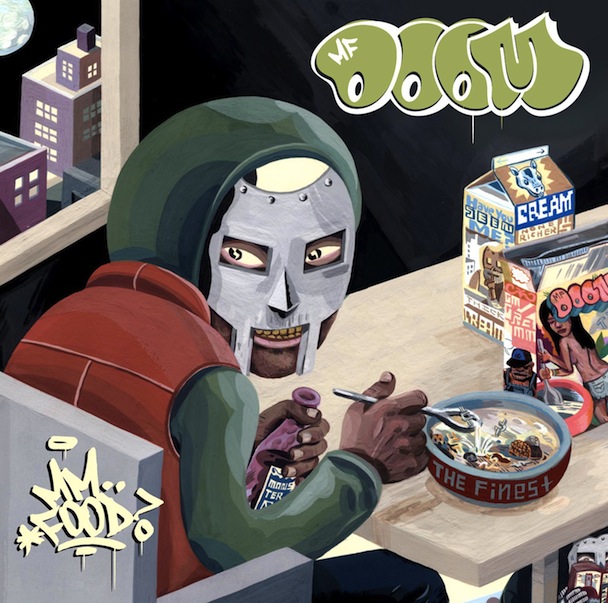
1. MF DOOM - Mm.. FOOD (2004)
I don't think you can discover Mm.. Food. Like a lot of individual DOOM tracks, I think you overhear a gem, and it comes for you. They home in, and something in the harmony of each song's components slams into your ear inescapably, like in that game Missile Command, and pretty soon you're nerding out with the worst of us about everything Metal Faced.
The problem is they're all gems on Mm.. Food. Goodbye to the incessant collaborators. One or two guest producers, but everything else from the mask. A theme frighteningly well-done -- food -- from which the greatest rapper alive extracts friendship, lust, loneliness, loyalty, hedonism, the possible decline of rap, jadedness toward old ways and new music, and maybe even a jadedness toward jadedness.
The album arrived at a peak in DOOM's labors. Emerging on the heels of four concentrated years of projects (including the production of masterpieces like MF Grimm's Downfall of Ibliys and Monsta Island Czars' Escape From Monster Island), the clipped primitivism of his beatmaking productively encountered the prescience of his alter ego. MF Doom could come down hard on flamboyant younger rappers but was also perfectly situated to ape the growing culture of fronting. The admittedly softer coterie of rappers who were not the drug-dealing, gangbanging personalities of yore (though they still claimed to be) presented the perfect career bridge: DOOM could continue to make music that was all costume and personality, but it would be on his terms, wherein the rap business became a ubiquitous, impenetrable supervillain bent on destroying (our) humanity.
Instead of entering the sonic realm of big egos and black-Amex ballers (which would not have been far from the silkier textures of Operation Doomsday), he retreated as far as he would ever get into the realm of his namesake, Dr. Doom, delicately crafting an album that could (sometimes entirely with samples) tell the story of a badly disfigured glutton overindulging in, of course, rapping. There are no slammers, no singles in the classical sense, with every song so complexly layered that listening to the album in parts becomes really unsatisfying.
Mm.. Food permitted DOOM to float above, to look at rap as a veteran, though one that had not yet dried up. The antidote to shuffle-ready club tracks was not to dote on the Golden Age but to be, in an old Afrofuturist trick, totally otherworldly. Throughout he's also corny, self-effacing, and hilarious. But especially on tracks like "Kookies" -- which is about when "One lonely evening alone home / end up with carpal tunnel syndrome" -- DOOM pumps the bass. As out-there as his beats and wordplay get, his revenge against contemporary rap always seems to circle back to the gross, the mundane, and the universal. DOOM is lusty, not sexy. Hungry, not sated. Coming down, not getting high. Ultimately, he uses his powers to extol being a nasty human being with basic disgusting desires; nothing really about luxury or excess. He raps on "Vomitspit" about hip-hop then and now: "It was the shit when I first scooped it / At least I get to sit out in New York and curse, stupid."
1. MF DOOM - Mm.. FOOD (2004)
I don't think you can discover Mm.. Food. Like a lot of individual DOOM tracks, I think you overhear a gem, and it comes for you. They home in, and something in the harmony of each song's components slams into your ear inescapably, like in that game Missile Command, and pretty soon you're nerding out with the worst of us about everything Metal Faced.
The problem is they're all gems on Mm.. Food. Goodbye to the incessant collaborators. One or two guest producers, but everything else from the mask. A theme frighteningly well-done -- food -- from which the greatest rapper alive extracts friendship, lust, loneliness, loyalty, hedonism, the possible decline of rap, jadedness toward old ways and new music, and maybe even a jadedness toward jadedness.
The album arrived at a peak in DOOM's labors. Emerging on the heels of four concentrated years of projects (including the production of masterpieces like MF Grimm's Downfall of Ibliys and Monsta Island Czars' Escape From Monster Island), the clipped primitivism of his beatmaking productively encountered the prescience of his alter ego. MF Doom could come down hard on flamboyant younger rappers but was also perfectly situated to ape the growing culture of fronting. The admittedly softer coterie of rappers who were not the drug-dealing, gangbanging personalities of yore (though they still claimed to be) presented the perfect career bridge: DOOM could continue to make music that was all costume and personality, but it would be on his terms, wherein the rap business became a ubiquitous, impenetrable supervillain bent on destroying (our) humanity.
Instead of entering the sonic realm of big egos and black-Amex ballers (which would not have been far from the silkier textures of Operation Doomsday), he retreated as far as he would ever get into the realm of his namesake, Dr. Doom, delicately crafting an album that could (sometimes entirely with samples) tell the story of a badly disfigured glutton overindulging in, of course, rapping. There are no slammers, no singles in the classical sense, with every song so complexly layered that listening to the album in parts becomes really unsatisfying.
Mm.. Food permitted DOOM to float above, to look at rap as a veteran, though one that had not yet dried up. The antidote to shuffle-ready club tracks was not to dote on the Golden Age but to be, in an old Afrofuturist trick, totally otherworldly. Throughout he's also corny, self-effacing, and hilarious. But especially on tracks like "Kookies" -- which is about when "One lonely evening alone home / end up with carpal tunnel syndrome" -- DOOM pumps the bass. As out-there as his beats and wordplay get, his revenge against contemporary rap always seems to circle back to the gross, the mundane, and the universal. DOOM is lusty, not sexy. Hungry, not sated. Coming down, not getting high. Ultimately, he uses his powers to extol being a nasty human being with basic disgusting desires; nothing really about luxury or excess. He raps on "Vomitspit" about hip-hop then and now: "It was the shit when I first scooped it / At least I get to sit out in New York and curse, stupid."
